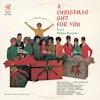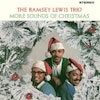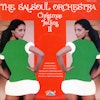Christmas music is mostly about childish exuberance and innocence, which turns a lot of people off. Where’s the darkness? Where’s the emotional complexity? For those emotions, there are few better places to turn than Phil Spector. To be sure, A Christmas Gift for You from Phil Spector bursts with all kinds of exuberance—as it happens, the wall of sound was simply made for Christmas tunes. But there is sinister subtext behind this album that makes it extra fascinating.
First, it was released on November 22, 1963, the day of the most brutal public assassination in American history. Perhaps as a result, the album tanked, even though it came out only three months after the Ronettes’ “Be My Baby” stormed the world. The Beatles’ Apple Records re-released it in 1972, burnishing its reputation in later years; but the fact remains, if you enjoy imagining yourself in a record’s time and place to really get into it, you’ve got to put yourself on a grassy knoll in Dallas while listening to this one.
Second, it is impossible to listen to Ronnie Spector’s voice without wondering what might have been. On one hand, if she had never met and married Phil Spector, we might have never heard of her. On the other, she might’ve had one of the longest and most successful careers of any female singer at the time, rather than ending up locked in Spector’s mansion. She had the talent, the looks, and a jazzy way of singing around the beat that set her apart from just about everyone else. Unfortunately, she also married a vicious and jealous man.
Third, Spector closes the album with a creepy spoken-word message to his fans about the wholesomeness of the season, extending his sincere wishes that everyone might have a merry Christmas. It’s weird enough on its own, but paired with the image of modern-day Spector—the wildly coiffed murderer—the whole thing seems like a surreal Halloween prank.
Subtext aside, the music simply shines. The album is straight girl-group R&B. One of its great accomplishments is taking “I Saw Mommy Kissing Santa Claus,” a song that has always been insufferable, and turning it into a saucy rumba with Ronnie Spector proving once again that if the arrangement and lead vocal are strong enough, you can literally sing about anything and make it compelling. In fact, any time Ronnie Spector is singing, the album soars, including on “Frosty the Snowman,” which might be the best version of that song ever recorded (respect to Jimmy Durante), and “Sleigh Ride,” with the famous backing vocals ring-a-ling-a-ling-a-ding-dong-ding. The rest of Phil Spector’s roster, which included Darlene Love, the Crystals, and Bob B. Soxx and the Blue Jeans, all put in excellent performances as well, the highlight being the Crystals’ “Christmas (Baby Please Come Home).”
Ultimately, though, any discussion of this album must return to darkness. While listening to Phil Spector in the full bloom of his genius, the mind can’t help but wander to the flip side of that coin—the depravity, the violence, the insanity that eventually overtook and destroyed that genius—and wonder why it had to work out that way, why genius and insanity often have so much in common. That’s a nut you can spend the whole season trying to crack.


